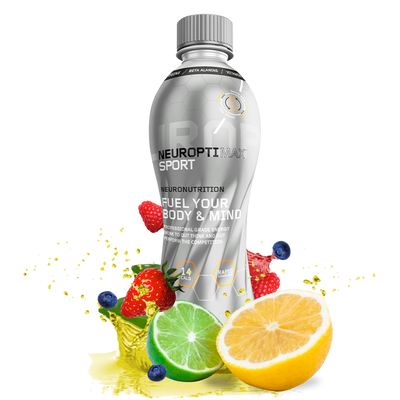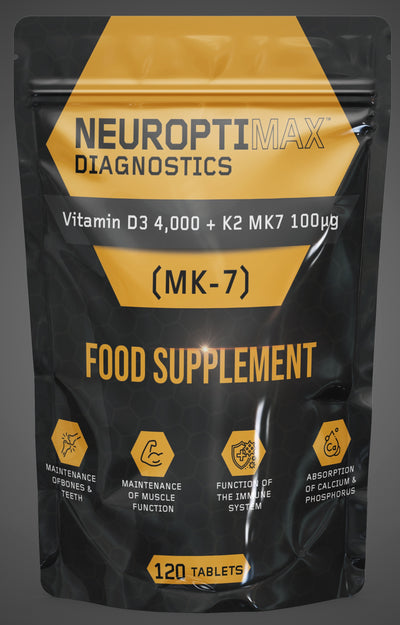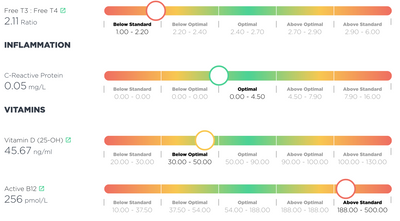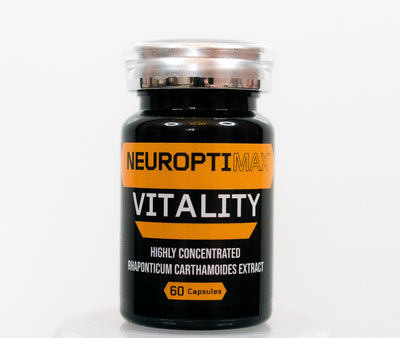
We asked our experts to share their thoughts regarding the hot topic of maintaining a healthy immune system.
Here are some of our favorite tips for protecting and maintaining your immune system.
1. Get your vitamins and minerals
Nutritional inadequacy (deficiency in vitamins and minerals) is linked to a depressed immune function and illness. Zinc is one of the trace elements that the body cannot produce itself; it has to be obtained via diet. If the body lacks the levels of zinc that it needs, this exerts a negative impact on the immune system. Neuroptimax pro contains a number of key immune “boosting” nutrients including zinc, vitamin D, magnesium, iron, vitamin E and more.
2. Boost your vitamin D levels
Vitamin D is crucial to activating our immune defenses. Without sufficient intake, the killer cells of the immune system (T cells) will not be able to react to and fight off serious infections. Vitamin D also upregulates anti-microbial peptides (a critical component of host defence against infection). Vit D may reduce COVID-19 severity by suppressing cytokine storm in COVID-19 patients. Leading researchers note, “the most vulnerable group of population for COVID-19 is also the one that is the most deficit in vitamin D.” Ensure you supplement with Vitamin D3 (at least 1000IUs a day) and, of course, enjoy the sunshine! Every scoop of Neuroptimax Pro contains 1000 IU of Vitamin D.
3. Carbohydrates and calories
Inadequate calorie intake (trying to lose weight while exercising intensely) causes a rise in cortisol. This is particularly true when carbohydrates are restricted. High intensity exercise requires large amounts of glucose. The body will compensate for inadequate glucose by increasing hormones such as glucagon (gluconeogenesis) and cortisol. Carbohydrate (CHO) feeding during exercise prevents the fall in blood sugar and reduces the magnitude of anti-inflammatory cytokines and stress hormones, thus helps to prevent exercise-induced immune function depression.
4. Stay hydrated and avoid dry mouth
Dehydration has been found to decrease salivary rate and decrease the concentration of salivary immunoglobulin A (s-IgA), which is one of the first lines of defences of the immune function against foreign bacteria. Hence it’s important to stay hydrated. How much fluid? There’s also no one-size-fits-all recommendation for how much people should drink. It depends on your body composition, if you exercise, environment. When in doubt, just use common sense: if your urine is darker than pale or light yellow, drink more. Some drinks are better than others at retaining fluids, most drinks will contribute to daily fluid requirements. Fluids that have a high electrolyte (sodium, potassium) content is responsible for fluid retention. Neuroptimax Pro contains key electrolytes such as sodium and potassium.
5. N-acetyl cysteine (NAC)
N-acetyl-L-cysteine is a chemical precursor to glutathione. Glutathione is a powerful antioxidant which helps protect neurons from oxidative stress. N-acetyl-L-cysteine also offers powerful support for the immune function and protects against insults from foreign compounds. In fact recent studies show N-Acetyl Cysteine supplement can possibly protect patients against COVID-19.
6. Get enough sleep and be consistent in your sleep schedule
Aim for at least 8 hours per night. Sleep and the circadian system (circadian rhythm is a roughly 24 hour cycle, commonly referred to as a clock, that controls alertness, sleep, hormone production, body temperature) are critical for your immune system.
Finally, wash your hands and do not neglect soap and water - sometimes, this is better than alcohol sanitizing gels.
Essential nutrients are critical for your immune function. Support yours everyday with Neuroptimax.
Further reading
Alpert, P. The role of vitamins and minerals on the immune system. Home Health Care Manag. Pract.2017, 29, 199–202. [Google Scholar] [CrossRef]
Baeke, F.; Takiishi, T.; Korf, H.; Gysemans, C.; Mathieu, C. Vitamin D: Modulator of the immune system. Curr. Opin. Pharmacol. 2010, 10, 482–496. [Google Scholar] [CrossRef] [PubMed]
Gleeson, M. Effects of exercise on immune function. Sports Sci. Exch. 2015, 28, 1–6. [Google Scholar]
Gleeson, M. Immunological aspects of sports nutrition. Immunol. Cell Biol. 2016, 94, 117–123. [Google Scholar] [CrossRef] [PubMed][Green Version]
Lee, G.Y.; Han, S.N. The Role of Vitamin E in Immunity. Nutrients 2018, 10, 1614. [Google Scholar] [CrossRef]
Macdonald, T.T.; Monteleone, G. Immunity, inflammation, and allergy in the gut. Science 2005, 307, 1920–1925. [Google Scholar] [CrossRef] [PubMed]
Maggini, S.; Maldonado, P.; Cardim, P.; Fernandez Newball, C.; Sota Latino, E. Vitamins C., D and zinc: Synergistic roles in immune function and infections. Vitam. Miner. 2017, 6, 167. [Google Scholar] [CrossRef]
Nieman, D. Immunonutrition support for athletes. Nutr. Rev. 2008, 66, 310–320. [Google Scholar] [CrossRef] [PubMed]
Wang, T.T.; Nestel, F.P.; Bourdeau, V.; Nagai, Y.; Wang, Q.; Liao, J.; Tavera-Mendoza, L.; Lin, R.; Hanrahan, J.W.; Mader, S.; et al. Cutting edge: 1,25-dihydroxyvitamin D3 is a direct inducer of antimicrobial peptide gene expression. J. Immunol. 2004, 173, 2909–2912. [Google Scholar] [CrossRef] [PubMed]




